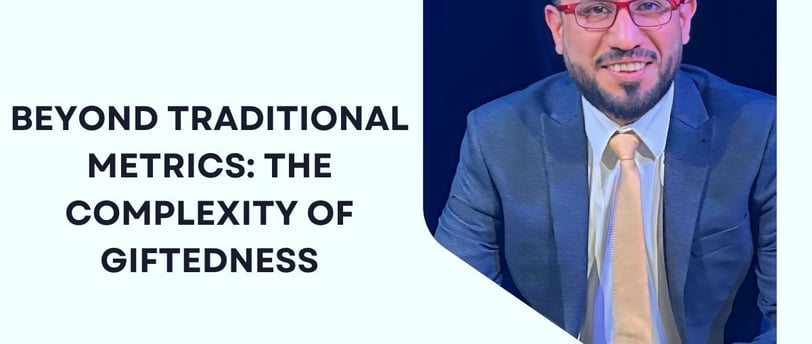BEYOND TRADITIONAL METRICS: THE COMPLEXITY OF GIFTEDNESS
In this blog post, I share a transformative experience with a gifted student whose exceptional abilities defied traditional expectations. Despite challenges like disorganized handwriting and delayed speech, his advanced cognitive skills and perfectionist traits prompted me to reconsider how we understand giftedness. Explore how embracing a multi-dimensional view of cognitive development can help us better support and nurture the unique potential of every gifted child.
GIFTED EDUCATION
Ahmed AL-Hajjaj
8/28/20241 min read


Reflecting on my teaching journey, one profound experience has significantly shaped my understanding of gifted education. In 2019, I encountered a student whose story challenged my perceptions of what it means to be gifted. Despite his disruptive behaviour and self-criticism, which often led others to misunderstand him, I recognised a remarkable potential—a gifted mind.
This student was diagnosed with autism at the age of 2.5 and didn't begin to speak until he was four and a half years old. Interestingly, his first words were not just words, but entire sentences. He demonstrated an extraordinary ability to recall early life events, indicating his remarkable memory skills. His curiosity was insatiable, and he consistently strove for perfection.
However, there was a contrasting aspect that challenged conventional perceptions of giftedness: his handwriting was indecipherable, disorganised and, in essence, far from perfect. This incongruity left many puzzled and made me question - Do we truly understand the cognitive development of gifted children?
Williams (2008) postulated that gifted children may withhold communication until they can articulate their ideas accurately. This perfectionist trait was evident in my student's reluctance to speak until he was capable of uttering complete sentences. The concept of perfectionism was also reflected in his need for order in the classroom and his pursuit of academic excellence.
However, his handwriting did not conform to this perfectionist tendency. This discrepancy compels us to reconsider our understanding of giftedness. It suggests that cognitive development in gifted children may not follow a linear or predictable path and that our perspective needs to be multi-dimensional to truly appreciate their capabilities and challenges.
Our understanding of giftedness should not be limited by traditional metrics of achievement or intelligence. It should account for the complex interplay of different cognitive abilities, emotional factors, and even seemingly contradictory traits. After all, every gifted child has a unique cognitive map, and it is our responsibility as educators to decode, understand, and nurture it for them to reach their full potential.
Education
Supporting gifted education for teachers and parents.
Gifted
Physics
+44 (0) 7940452515
© 2024. All rights reserved.
